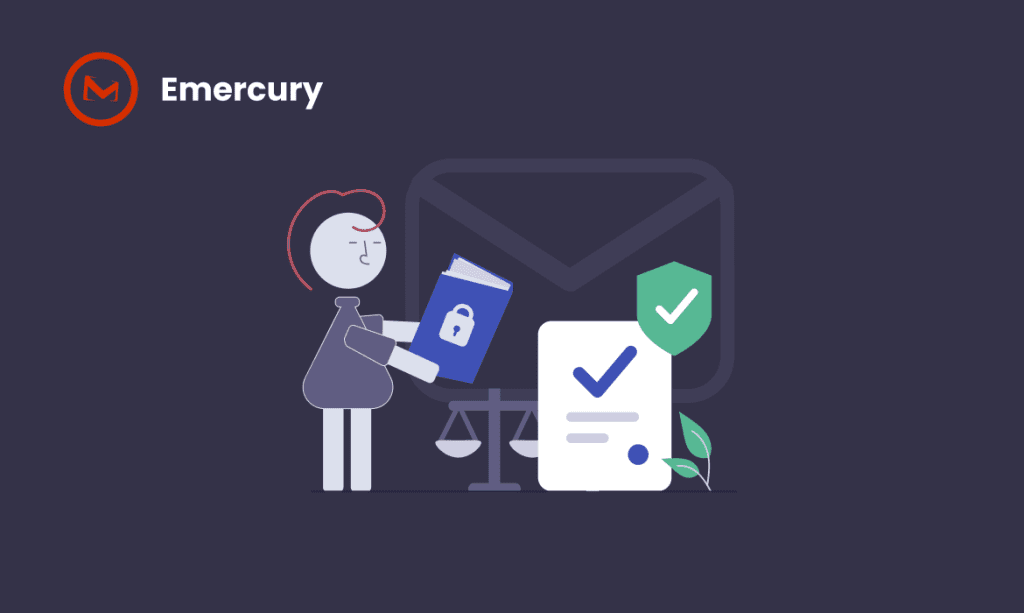The global email marketing landscape has transformed dramatically in recent years, with stringent email compliance regulations reshaping how businesses communicate with their audiences. With GDPR fines reaching €20 million and CAN-SPAM penalties up to $53,088 per violation, understanding and implementing proper compliance measures is no longer optional—it’s essential for business survival.

Modern businesses face an increasingly complex web of international email regulations that vary significantly across jurisdictions. While some regions require explicit consent before sending any marketing communication, others allow implied consent based on existing business relationships. This patchwork of regulations creates challenges for organizations operating globally, requiring sophisticated compliance strategies to navigate successfully.
The stakes have never been higher for email marketers. Beyond financial penalties, non-compliance can result in severe reputation damage, loss of customer trust, and potential criminal liability in extreme cases. Organizations that prioritize email compliance regulations from the outset protect themselves from these risks while building stronger, more trusting relationships with their audiences.
For businesses navigating this compliance maze, choosing an email platform that prioritizes fundamentals over flashy features becomes critical. Emercury’s philosophy of focusing on core email marketing capabilities—including list management, segmentation, and deliverability—provides the foundation needed for compliance without overwhelming users with unnecessary complexity.
Understanding the Global Email Compliance Landscape
Understanding the Foundation of Email Compliance
Protect Your Business with Emercury’s Compliance-First Platform
Before diving into regulations, know that Emercury handles the complexity for you:
- Automated GDPR, CAN-SPAM, and CASL compliance built-in
- Geographic segmentation to apply correct regulations automatically
- Double opt-in automation with detailed consent tracking
- Instant unsubscribe processing across all campaigns
- Comprehensive audit trails for regulatory inspections
- Free forever plan to test compliance features risk-free
With potential fines reaching €20 million, choosing a platform that prioritizes compliance isn’t optional—it’s essential.
[Start Compliant Email Marketing Free →]
The Foundation of Email Compliance
The Foundation of Email Compliance
Email compliance encompasses a broad spectrum of regulations designed to protect consumer privacy, prevent spam, and ensure transparent communication practices. These regulations govern everything from how businesses collect email addresses to how they handle unsubscribe requests and store personal data.
Core compliance principles include:
- Consent management: Obtaining proper permission before sending emails
- Transparency: Clear identification of senders and honest subject lines
- Choice and control: Providing easy opt-out mechanisms
- Data protection: Securing personal information against breaches
- Retention policies: Managing data storage and deletion requirements
Regional Variations and Challenges
The complexity of email compliance stems from the significant variations in requirements across different jurisdictions. What constitutes acceptable practice in one region may violate regulations in another, creating compliance challenges for businesses with international audiences.
Key regional differences:
- Consent requirements: Explicit vs. implied consent standards
- Penalty structures: Varying fine amounts and enforcement mechanisms
- Data protection levels: Different standards for personal information security
- Enforcement approaches: Proactive vs. complaint-driven regulatory action
- Business relationship definitions: Varying criteria for existing customer communications
Managing these variations requires robust email platform capabilities. Emercury’s approach focuses on the fundamentals that matter: powerful segmentation to separate audiences by geography, comprehensive suppression lists that work across all campaigns, and detailed tracking to document compliance efforts. Unlike platforms that lock essential features behind enterprise pricing, Emercury provides these tools on all plans, including the free tier.
Major International Email Compliance Regulations
General Data Protection Regulation (GDPR)
The European Union’s General Data Protection Regulation, effective since May 2018, represents one of the world’s most comprehensive data protection frameworks. GDPR affects any business processing personal data of EU residents, regardless of the business location.
GDPR email marketing requirements:
- Explicit consent: Businesses must obtain clear, unambiguous consent through affirmative action like checking an opt-in box. Pre-checked boxes or bundled consent are prohibited.
- Purpose limitation: Data collection must be limited to specific, legitimate purposes clearly communicated to data subjects.
- Data minimization: Only collect personal data necessary for stated purposes.
- Right to erasure: Individuals can request complete deletion of their personal data, requiring businesses to remove information from all systems.
- Data portability: Provide data subjects with their personal data in a structured, machine-readable format.
GDPR penalties and enforcement:
- Maximum fines: €20 million or 4% of annual global turnover, whichever is higher
- Data breach notification: Must notify authorities within 72 hours
- Data Protection Officer requirements: Mandatory for businesses processing large volumes of personal data
- Privacy by design: Data protection must be built into systems from the ground up
These stringent requirements make choosing the right email platform critical. Emercury’s philosophy of providing all features regardless of plan tier means businesses can implement GDPR compliance without expensive upgrades. The platform’s segmentation tools allow geographic targeting, suppression lists ensure opt-outs are honored, and the Journey Builder can create compliant double opt-in workflows—all available even on the free plan.
CAN-SPAM Act (United States)
The Controlling the Assault of Non-Solicited Pornography And Marketing Act, enacted in 2003, establishes US federal standards for commercial email communications. CAN-SPAM applies to all commercial emails sent to US recipients.
CAN-SPAM requirements:
- Accurate header information: Sender name, email address, and routing information must be truthful and identify the actual sender.
- Non-deceptive subject lines: Subject lines must accurately reflect email content and not mislead recipients about the message purpose.
- Advertisement identification: Commercial emails must be clearly identified as advertisements, though the law provides flexibility in how this disclosure is made.
- Physical address inclusion: Every email must contain the sender’s valid physical postal address.
- Opt-out mechanism: Provide a clear, conspicuous unsubscribe method that processes requests within 10 business days.
CAN-SPAM penalties:
- Per-email fines: Up to $53,088 per violating email
- Criminal penalties: Potential imprisonment for aggravated violations
- Multiple violator liability: Both the advertiser and sender can be held responsible
- ISP enforcement: Internet service providers can pursue civil remedies
Meeting CAN-SPAM requirements becomes straightforward with proper email platform support. Emercury users benefit from built-in suppression management that processes unsubscribes across all campaigns, reducing violation risk. The platform’s focus on deliverability fundamentals means your compliant emails actually reach inboxes, while human support helps navigate complex compliance questions that automated chatbots can’t answer.
Canada’s Anti-Spam Legislation (CASL)
CASL, effective since 2014, is considered one of the world’s strictest anti-spam laws. It requires express or implied consent for commercial electronic messages sent to Canadian recipients.
CASL consent types:
- Express consent: Obtained through clear opt-in mechanisms where recipients explicitly agree to receive communications.
- Implied consent: Based on existing business relationships, such as recent purchases or inquiries, with specific time limitations.
CASL requirements:
- Sender identification: Clear identification of the person or business sending the message.
- Contact information: Include valid contact details for the sender.
- Unsubscribe mechanism: Provide an easy opt-out method that processes requests within 10 business days.
- Consent documentation: Maintain records of how and when consent was obtained.
CASL penalties:
- Individual violations: Up to CA$1 million per violation
- Business violations: Up to CA$10 million per violation
- Private right of action: Individuals can sue for damages (currently suspended)
Such severe penalties underscore why choosing a platform like Emercury, with its robust suppression management and segmentation tools, becomes a business-critical decision.
Additional International Regulations
Australia’s Spam Act 2003
Requires consent (express or inferred) for commercial emails and mandates functional unsubscribe mechanisms. Penalties reach AU$1.1 million per day for organizations.
Brazil’s Lei Geral de Proteção de Dados (LGPD)
Similar to GDPR, LGPD governs personal data processing of Brazilian residents and requires explicit consent for data collection and processing.
India’s Digital Personal Data Protection Bill
Emerging regulations requiring explicit consent for data processing and providing individuals with rights to access, correct, and delete personal information.
Consent Management and Best Practices
Types of Consent
Understanding different consent types is crucial for global email compliance. The strength and validity of consent vary significantly across jurisdictions.
Explicit consent: The gold standard under GDPR, requiring clear affirmative action by the data subject. This includes:
- Checking an opt-in box
- Clicking a subscribe button
- Completing a signup form
- Verbally agreeing (with proper documentation)
Implied consent: Acceptable under CAN-SPAM and limited GDPR circumstances, inferred from:
- Recent business transactions
- Inquiry or information requests
- Existing customer relationships
- Public availability of contact information
Soft opt-in exception: Allows marketing to existing customers about similar products if:
- Contact information was obtained during a sale or negotiation
- Clear opt-out options were provided initially
- Every subsequent email includes unsubscribe mechanisms
- Marketing focuses on similar products or services
Implementing Robust Consent Mechanisms
Double opt-in processes provide the strongest consent evidence and improve compliance across all jurisdictions:
- Initial signup: User provides email address through form or subscription
- Confirmation email: System sends verification message with confirmation link
- Active confirmation: User clicks link to confirm subscription
- Welcome message: Final confirmation acknowledging successful subscription
Consent documentation requirements:
- Date and time: When consent was obtained
- Method: How consent was collected (form, verbal, etc.)
- Content: What the user consented to receive
- Evidence: Records of the consent process
- Updates: Any changes to consent preferences
Emercury’s platform supports these consent documentation needs through its core features. Custom fields can track consent dates and sources, the Advanced Segment Builder creates groups based on consent type, and the Journey Builder automates double opt-in sequences. Unlike platforms that charge extra for these capabilities, Emercury includes them in every plan—even the free tier offering 12,000 emails monthly.
Managing Consent Across Multiple Jurisdictions
Geographic segmentation strategies:
- Location-based lists: Separate email lists by recipient location to apply appropriate regulations.
- Consent level tracking: Tag subscribers with their consent type and jurisdiction for targeted compliance.
- Unified compliance approach: Implement the strictest standards globally to simplify management while ensuring maximum protection.
Emercury’s Compliance-First Email Marketing Platform
Built-in Compliance Features
Emercury’s email marketing platform prioritizes compliance by design, incorporating essential features that automatically support regulatory requirements across multiple jurisdictions.
Advanced consent management:
- Customizable opt-in forms: Create GDPR-compliant signup forms with clear consent language
- Double opt-in automation: Automated confirmation processes that strengthen consent evidence
- Consent tracking: Detailed logs of when, how, and what users consented to receive
- Geographic targeting: Segment lists based on recipient location for jurisdiction-specific compliance
Automated compliance features:
- Unsubscribe handling: Instant processing of opt-out requests across all campaigns
- List hygiene: Automatic removal of invalid addresses and bounce management
- Data retention controls: Configurable retention periods to meet regulatory requirements
- Audit trails: Comprehensive logging for compliance reporting and audits
Global Compliance Support
Multi-jurisdiction compliance through core features:
Emercury handles international compliance through fundamental tools that adapt to any regulation:
- Advanced Segment Builder: Create unlimited segments based on geography, consent type, or engagement—essential for applying different rules to different audiences
- Suppression Management: Never-email lists and suppression lists ensure opt-outs are honored globally, preventing violations across jurisdictions
- Custom Fields & Tags: Track consent sources, dates, and types for any regulatory framework
- Journey Builder: Automate compliant workflows like double opt-in sequences without manual intervention
- Human Support: Unlike chatbot-only platforms, get real answers about compliance from actual email marketing experts
These aren’t premium features—they’re available on every plan, including free accounts. This approach means a small business can maintain the same compliance standards as an enterprise client.
Data protection measures:
- Encryption in transit and at rest: Protect personal data during transmission and storage
- Access controls: Role-based permissions to limit data access
- Secure infrastructure: Enterprise-grade security measures protecting customer data
- Regular security audits: Ongoing assessments to maintain protection standards
Compliance Reporting and Analytics
Emercury provides comprehensive compliance reporting to help businesses monitor their adherence to email regulations and identify potential issues before they become problems.
Key compliance metrics:
- Consent acquisition rates: Track opt-in performance across different channels
- Unsubscribe processing times: Monitor response times to ensure regulatory compliance
- Data retention status: Oversee data lifecycle management and deletion schedules
- Geographic compliance coverage: Verify appropriate regulation application by recipient location
International Compliance Strategies
Building a Global Compliance Framework
Risk assessment and mapping:
- Jurisdiction analysis: Identify all regions where your business operates or has customers to determine applicable regulations.
- Compliance gap assessment: Compare current practices against requirements in each jurisdiction to identify areas needing improvement.
- Risk prioritization: Focus on high-risk areas based on potential penalties, enforcement likelihood, and business impact.
- Implementation roadmap: Develop phased approach to address compliance gaps based on risk assessment results.
Executing this framework requires an email platform that doesn’t restrict essential features. Emercury’s fair pricing model—pay for email volume, not features—ensures businesses can implement proper compliance regardless of budget. The platform’s free tier (12,000 emails monthly) includes the same segmentation, suppression, and tracking tools as paid plans, allowing thorough compliance testing without financial commitment.
Legal and Technical Infrastructure
Legal compliance foundation:
- Privacy policy development: Create comprehensive privacy policies that address all applicable regulations and clearly explain data processing practices.
- Data processing agreements: Establish contracts with third-party processors that meet GDPR Article 28 requirements and similar provisions in other regulations.
- Consent management systems: Implement technical solutions that capture, store, and manage consent across all touchpoints.
- Employee training programs: Educate staff on compliance requirements, data handling procedures, and incident response protocols.
Technical compliance measures:
- Data encryption: Implement end-to-end encryption for personal data in transit and at rest.
- Access logging: Monitor and log all access to personal data for audit and security purposes.
- Automated deletion: Set up systems to automatically delete data based on retention schedules and user requests.
- Backup and recovery: Ensure compliance measures extend to backup systems and disaster recovery procedures.
Emercury’s infrastructure supports these technical measures while maintaining the platform’s focus on usability and fair pricing.
Ongoing Compliance Management
Regular compliance audits:
- Internal assessments: Conduct quarterly reviews of compliance processes, procedures, and technology systems.
- External audits: Engage third-party specialists for annual comprehensive compliance assessments.
- Regulatory monitoring: Stay informed about regulatory changes and enforcement trends across all relevant jurisdictions.
- Incident response planning: Develop and test procedures for handling data breaches, compliance violations, and regulatory inquiries.
Industry-Specific Compliance Requirements
Healthcare and HIPAA
Healthcare organizations face additional compliance requirements under the Health Insurance Portability and Accountability Act (HIPAA) when sending emails containing protected health information (PHI).
HIPAA email requirements:
- Business Associate Agreements: Third-party email service providers must sign BAAs acknowledging HIPAA compliance responsibilities.
- Encryption standards: PHI must be encrypted in transit and at rest using HIPAA-approved methods.
- Access controls: Implement role-based access to limit PHI exposure to authorized personnel only.
- Audit trails: Maintain detailed logs of all PHI access and transmission activities.
While Emercury doesn’t specifically market HIPAA compliance, its fundamental features support healthcare email needs. The platform’s focus on deliverability ensures critical healthcare communications reach patients, while suppression management prevents sending to opted-out recipients. Human support can guide healthcare organizations through email best practices, though specific HIPAA requirements should be verified with legal counsel.
Financial Services and GLBA
The Gramm-Leach-Bliley Act (GLBA) requires financial institutions to protect customer financial information in email communications.
GLBA compliance measures:
- Privacy notices: Provide clear explanations of data collection and sharing practices.
- Opt-out rights: Allow customers to limit information sharing with third parties.
- Safeguards rule: Implement administrative, technical, and physical safeguards for customer information.
Vendor management: Ensure third-party service providers meet GLBA security requirements.
Education and FERPA
Educational institutions must comply with the Family Educational Rights and Privacy Act (FERPA) when emailing student information.
FERPA email considerations:
- Directory information: Distinguish between directory and non-directory information for email purposes.
- Consent requirements: Obtain explicit consent before sharing non-directory educational records.
- Access limitations: Restrict email content to individuals with legitimate educational interests.
- Record keeping: Maintain logs of educational record disclosures via email.
Emercury’s Advanced Compliance Solutions
Automated Compliance Monitoring
Emercury’s platform continuously monitors compliance across all email campaigns, providing real-time alerts and recommendations to maintain regulatory adherence.
Intelligent compliance features:
- Smart segmentation: Automatically apply appropriate compliance rules based on recipient location and consent status.
- Content scanning: AI-powered analysis identifies potential compliance issues in email content before sending.
- Regulatory updates: Automatic system updates to reflect changes in email compliance regulations.
- Compliance scoring: Real-time assessment of campaign compliance status with improvement recommendations.
Enterprise Compliance Management
For larger organizations with complex compliance needs, Emercury offers enterprise-grade features that support sophisticated compliance management requirements.
Advanced enterprise features:
- Multi-team workflows: Compliance approval processes for campaigns across different departments and regions.
- Custom compliance rules: Configurable rules engine to implement organization-specific compliance requirements.
- Integration capabilities: APIs and webhooks for connecting with existing compliance and legal systems.
- Dedicated support: Expert compliance consultation and dedicated account management for enterprise clients.
Compliance Training and Resources
Emercury provides comprehensive training and educational resources to help businesses understand and implement email compliance best practices.
Educational offerings:
- Compliance webinars: Regular training sessions on emerging regulations and best practices.
- Resource library: Comprehensive guides, templates, and checklists for compliance implementation.
- Expert consultation: Access to compliance specialists for guidance on complex requirements.
- Certification programs: Training courses that provide formal compliance education and certification.
Future-Proofing Your Compliance Strategy
Emerging Regulatory Trends
The email compliance landscape continues evolving as governments respond to changing technology and privacy concerns. Organizations must stay ahead of these trends to maintain compliance.
Key regulatory developments:
- AI and automation governance: New regulations addressing automated decision-making in email marketing and customer communications.
- Cross-border data transfer restrictions: Increasing limitations on international data transfers requiring localized compliance approaches.
- Enhanced individual rights: Expanding privacy rights including data portability, algorithmic transparency, and automated processing restrictions.
- Increased enforcement activity: More aggressive regulatory enforcement with higher penalties and more frequent audits.
Technology and Compliance Innovation
Advanced compliance technologies are emerging to help businesses manage increasingly complex regulatory requirements while maintaining marketing effectiveness.
Innovation areas:
- Privacy-preserving analytics: Technologies that provide marketing insights without compromising individual privacy.
- Blockchain consent management: Immutable consent records that provide indisputable evidence of permission.
- AI-powered compliance: Machine learning systems that automatically adapt to regulatory changes and optimize compliance practices.
- Zero-party data strategies: Direct data collection approaches that enhance compliance while improving personalization.
Compliance Implementation Checklist
Immediate Action Items
Assessment and planning:
✓ Conduct compliance audit: Review current practices against all applicable regulations
✓ Map customer locations: Identify which regulations apply to your email recipients
✓ Document consent sources: Catalog how and when you obtained permission to email each subscriber
✓ Review email content: Ensure all marketing emails meet disclosure and identification requirements
Technical implementation:
✓ Implement double opt-in: Strengthen consent evidence with confirmation processes
✓ Update unsubscribe mechanisms: Ensure one-click unsubscribe functionality across all emails
✓ Enhance data security: Implement encryption and access controls for personal data
✓ Set up retention policies: Configure automatic data deletion based on regulatory requirements
Ongoing Compliance Management
Regular monitoring:
✓ Monitor regulatory changes: Stay informed about updates to email compliance laws
✓ Conduct quarterly audits: Regularly assess compliance processes and identify improvements
✓ Train team members: Provide ongoing education on compliance requirements and best practices
✓ Review vendor agreements: Ensure all third-party providers meet compliance standards
Performance optimization:
✓ Track compliance metrics: Monitor consent rates, unsubscribe processing, and audit trail completeness
✓ Analyze geographic performance: Assess campaign effectiveness across different regulatory jurisdictions
✓ Optimize consent flows: Continuously improve signup processes to maximize compliant subscriptions
✓ Document improvements: Maintain records of compliance enhancements and their business impact
Conclusion
Navigating the complex landscape of email compliance regulations requires a comprehensive understanding of international requirements, robust technical implementation, and ongoing commitment to best practices. As regulations continue evolving and enforcement becomes more aggressive, businesses must prioritize compliance from the outset to protect themselves from significant financial and reputational risks.
Emercury’s compliance-first approach provides businesses with the tools, features, and expertise needed to maintain regulatory compliance while maximizing email marketing effectiveness. Our advanced email marketing platform includes built-in compliance features that automatically support GDPR, CAN-SPAM, and other international regulations.
The investment in proper compliance infrastructure pays dividends beyond risk mitigation. Organizations that prioritize email compliance regulations build stronger customer relationships, improve email deliverability, and create sustainable competitive advantages in an increasingly privacy-conscious marketplace.
Take action today to assess your current compliance status and implement the necessary measures to protect your business. Partner with Emercury’s expert team to ensure your email marketing programs meet all regulatory requirements while driving exceptional results. The cost of compliance is always less than the cost of violations, making proper implementation not just a legal necessity but a smart business strategy.
Remember that compliance is not a one-time project but an ongoing commitment requiring regular assessment, continuous improvement, and adaptation to emerging regulatory requirements. With the right platform, processes, and partner, achieving and maintaining email compliance regulations becomes a manageable and strategic advantage rather than a burdensome obligation.
[Get Started with Emercury’s Free Plan →]
Join over 10,000 businesses that rely on Emercury for dependable email marketing that prioritizes both compliance and results. Whether you’re sending 100 emails or 100,000, you get the same powerful tools and human support.
FAQ
What are email compliance regulations?
Email compliance regulations are laws that govern commercial email communications to protect consumer privacy and prevent spam. Key regulations include GDPR (Europe), CAN-SPAM Act (US), CASL (Canada), and industry-specific rules like HIPAA for healthcare communications.
What happens if I violate email compliance laws?
Violations can result in significant penalties: GDPR fines up to €20 million or 4% of global revenue, CAN-SPAM penalties up to $53,088 per email, and CASL fines up to CA$10 million for businesses. Additional consequences include reputation damage and customer trust loss.
Do I need consent to send marketing emails?
Consent requirements vary by jurisdiction. GDPR requires explicit consent for EU recipients, CAN-SPAM allows implied consent in the US, and CASL demands express consent in Canada. The safest approach is obtaining explicit consent from all recipients regardless of location.
What is the difference between explicit and implied consent?
Explicit consent requires a clear, affirmative action like checking an opt-in box or signing up for emails. Implied consent is inferred from existing business relationships, such as customers who purchased products or provided contact information during transactions.
What information must be included in marketing emails?
All marketing emails must include accurate sender identification, valid physical postal address, clear unsubscribe mechanism, truthful subject lines, and proper advertisement disclosure. These requirements ensure transparency and give recipients control over future communications.
How quickly must unsubscribe requests be processed?
Processing times vary by regulation: CAN-SPAM requires processing within 10 business days, CASL requires processing within 10 business days, and GDPR requires prompt processing without unnecessary delay. Best practice is immediate processing to maintain compliance.
What is the soft opt-in exception?
The soft opt-in exception allows businesses to send marketing emails to existing customers about similar products or services without explicit consent, provided they offered clear opt-out options when collecting contact information and in every subsequent email.
How does GDPR affect email marketing outside Europe?
GDPR applies to any business processing personal data of EU residents, regardless of the business location. If your email list includes EU citizens, you must comply with GDPR requirements including explicit consent, data protection measures, and individual rights like data erasure.
What records should I keep for email compliance?
Maintain detailed records of consent collection including date, time, method, and specific permissions granted. Document unsubscribe requests, data processing activities, and compliance training. These records are essential for audits and proving compliance during investigations.
Can I buy email lists for marketing?
Purchasing email lists is generally not compliant with GDPR and risky under other regulations, as recipients haven’t consented to receive emails from your specific business. Focus on building organic lists through opt-in forms, content marketing, and lead magnets.
What is double opt-in and when should I use it?
Double opt-in requires users to confirm their subscription via email after initial signup. This process provides stronger consent evidence, improves list quality, reduces spam complaints, and offers better protection against compliance violations, especially for GDPR.
How do I handle data subject rights under GDPR?
GDPR grants individuals rights to access, rectify, erase, and port their data. Implement procedures to handle these requests within 30 days, verify requestor identity, maintain request logs, and ensure complete data removal from all systems when erasure is requested.
What are the key differences between US and EU email laws?
US laws (CAN-SPAM) focus on opt-out mechanisms and truthful messaging, while EU laws (GDPR) emphasize opt-in consent and data protection. GDPR has stricter consent requirements, higher penalties, and broader individual rights compared to CAN-SPAM.
How should I segment my email list for compliance?
Segment lists by geographic location to apply appropriate regulations, consent type to track permission levels, and date of consent to manage retention periods. This enables targeted compliance approaches while maintaining detailed audit trails for regulatory requirements.
What compliance features should I look for in email platforms?
Essential features include automated consent management, built-in unsubscribe handling, data retention controls, audit trail capabilities, GDPR-compliant data processing agreements, geographic segmentation tools, and compliance reporting dashboards for ongoing monitoring.



